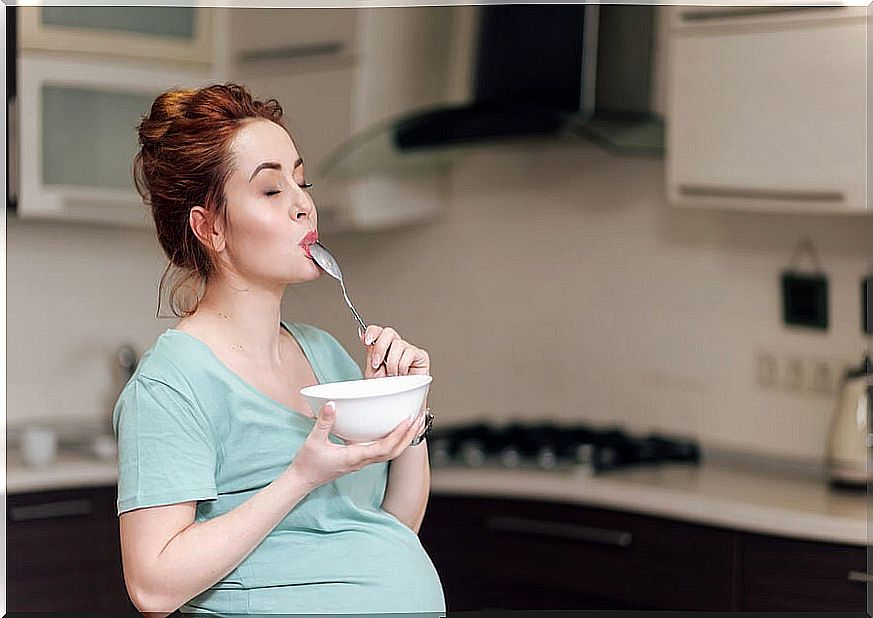Yodocefol: The Routine Of Every Pregnant Woman

In pregnancy, the needs for energy, protein, vitamins and minerals are increased. The diet should be the main source of the necessary nutrients. However, sometimes, it is necessary to resort to supplements such as iodocefol.
Fetal development is a critical stage. The excess or deficiency of certain nutrients during pregnancy can determine the risk of suffering from certain diseases in adult life.
Some micronutrients such as folic acid, vitamin B12 or iodine are especially important. And precisely these are what make up this supplement called iodocefol. Let’s dive into it a bit.
What is iodocefol?
Yodocefol is the brand name of a supplement of folic acid, vitamin B12 and iodine, recommended in pregnancy. In pregnancy there is an increased need for these nutrients and, sometimes, it is not covered by the diet.
Each tablet of Yodocefol contains:
- Folic acid : 400 micrograms.
- Vitamin B12 : 2 micrograms.
- Potassium iodide : 262 micrograms (equivalent to 200 micrograms of iodine).
It is indicated for the prevention of iodine, folic acid and vitamin B12 deficiency disorders in pregnant women. It is also indicated before conception to prevent neural tube defects and neurological disorders in the fetus.
According to the indications of its technical sheet, one tablet should be taken a day from one month before conception until the end of the first trimester of pregnancy. However, it is often recommended to continue until delivery and even while breastfeeding. Let’s take a closer look at its composition to understand its importance.

Folic acid
Folic acid is a B group vitamin, specifically vitamin B9. It is a key piece in the synthesis, repair and functioning of DNA and RNA.
Folic acid deficiency causes faulty DNA synthesis in any cell that tries to replicate. Therefore, the consequences are more serious in tissues with a higher rate of growth and cell division.
It is also of crucial importance in the formation of the central nervous system. This is because it participates in the biosynthesis of amino acids and nucleic acids. In pregnancy, this process takes place between days 15 and 28 after conception.
Folic acid administered as a supplement is better absorbed than that ingested in the diet. That is why supplementation is so important to prevent the appearance of neural tube defects in the fetus, such as spina bifida.
B12 vitamin
Vitamin B12 is cyanocobalamin. It is necessary for the synthesis of DNA and is involved in the process of cell division. It is also involved in the metabolism of lipids, proteins, and carbohydrates, and is necessary in the synthesis of myelin and in hematopoiesis.
It is related to folic acid, although in a rather complicated way. It is involved as a cofactor in one of the main reactions of the metabolic pathway of the enzyme methionine synthase. Therefore, its deficiency is a limiting factor for the activation of folic acid.
In addition, vitamin B12 also participates in the uptake of folic acid by the cell. In short, a cell deficient in vitamin B12 will also be deficient in folic acid.
Potassium iodide
Iodine is an essential element for the synthesis of thyroid hormones, necessary throughout life for the correct functioning of the central nervous system:
- Thyroxine (T4).
- Triiodothyronine (T3).
They are especially important during the development stage. The insufficiency of these hormones is accompanied by permanent and irreversible anatomical and functional alterations of the brain.
Iodine, apart from synthesizing thyroid hormones, directly influences thyroid functions. Likewise, it also has a great influence on cell proliferation.
Iodine deficiency is the world’s leading foreseeable cause of fetal and infant brain injury. And also the delay of psychomotor development in young children. It can cause hypothyroidism and brain damage.
Side effects of iodocefol
Adverse reactions that may occur with iodozefol treatment are classified as uncommon. It is considered a very safe drug, especially in pregnancy.
In the event of an overdose, the compound that would affect the most would be iodine. Since it crosses the placenta and the fetus is sensitive to this compound, doses of iodine should not be administered at the milligram level.
If large doses are administered or for long periods of time, manifestations of iodism may occur . Some of the symptoms are:
- Metallic taste
- Burning in the mouth and throat.
- Painful sensitivity in teeth and gums.

- Increased salivation
- Sneezing
- Coryza or acute rhinitis.
- Eye irritation with swelling of the eyelids.
- Strong headache.
- Productive cough
- Pulmonary edema.
- Rashes.
- Gastric irritation.
- Diarrhea.
Thyroid gland hyperplasia, thyroid adenoma, goiter, and severe hypothyroidism can also occur. However, the signs and symptoms of iodism usually disappear spontaneously after stopping treatment.
The indiscriminate use of supplements during pregnancy can cause unwanted side effects due to excessive doses of vitamins and minerals. Therefore, it is important to always follow the advice of the specialist.










